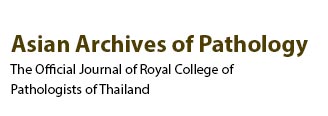Risa Chaisuparat1 M.D., Limpiwatana S2 M.D., Kongpanitkul S2 M.D., Yodsanga S1 M.D.
1Department of Oral Pathology, Faculty of Dentistry, Chulalongkorn University, Henry-Dunant Road,
Pathumwan, Bangkok 10330, Thailand
2Undergraduate student, Faculty of Dentistry, Chulalongkorn University, Henry-Dunant Road, Pathumwan,
Bangkok 10330, Thailand
ABSTRACT
Objective: The Akt/mTOR pathway is activated in many malignancies including oral squamous cell
carcinoma (OSCC). Oral verrucous carcinoma (OVC) is a low grade variant of OSCC. However, the role of the
Akt/mTOR pathway in OVC remains unknown. The objective of this study was to investigate the activation
level of the important markers of the Akt/mTOR pathway in the OVC in comparison to the OSCC.
Methods: Thirty OSCC cases, 18 OVC cases and 30 control cases (normal oral mucosa) were enrolled in
this study. The expression of p-Akt (Thr308), p-Akt (Ser473), and p-RPS6 was evaluated by immunohistochemistry.
Statistical analysis was performed to determine the differences in protein expression between
lesions.
Results: All OVC cases were positive for p-Akt (Thr308), p-Akt (Ser473) and p-RPS6. There were signifi cant
differences in expression level of all studied proteins between control group and OVC (P<0.05) as well as
between OSCC and OVC (P<0.05). However, OVC showed a signifi cant lower intensity staining than that of
OSCC (P<0.05 in all 3 proteins).
Conclusions: Our fi ndings demonstrate that the Akt/mTOR pathway is upregulated in OVC, indicating a role
of this pathway in the development and progression of this malignancy.


